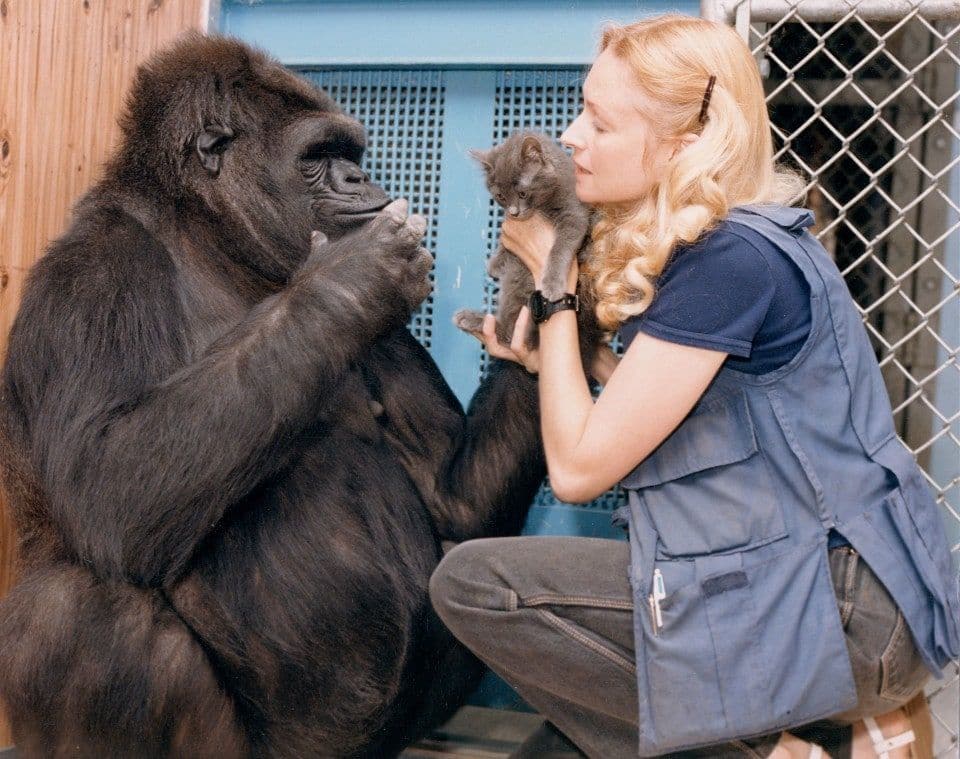On the 4th of July, 1971, Koko was born in captivity at San Francisco Zoo. She was a Western Lowland Gorilla, which is ranked as critically endangered according to the IUCN. Francine ‘Penny’ Patterson, an animal psychologist, was studying for her doctorate at the time she was assigned to Koko, when Koko’s mother fell dangerously ill. She started teaching Koko an altered version of American Sign Language, or ‘Gorilla Sign Language’ as she called it. By the time she was an adult, Koko could sign up to 1,000 different signs and understand 2000 words of spoken English. This put her at the same level as a 3 year old human, with much extensive research showing that her IQ was around 75 to 95.
In many cases, Koko showed human-like emotions and characteristics, ranging from being territorial and judgemental, to having a wild sense of humour. In 1985, National Geographic interviewer Cynthia Gorney visited Koko in her Santa Cruz home. Koko did not warm to her at all, signing to Penny and calling Gorney a toilet. However Koko did warm up to her after that, and when asked where dead gorillas go, Koko signed saying, ‘COMFORTABLE HOME BYE.’ Koko also showed a strong reaction to sad situations. When watching her favorite movie (Tea with Mussolinni), Koko turned around from the TV when the scene showed a boy being kissed by his mother goodbye before boarding a train. Koko was also heartbroken when her first kitten, who was named All-Ball, died. She signed numerous negative signs like ‘Sad’ and ‘Frown’ and was recorded weeping like a human. Koko showed a high self confidence, as one of the first words she used to describe herself was ‘Queen’ (shown by dragging your hand diagonally across your chest.) This might have been because of all the scientists and journalists taking an interest, and Koko must have realized she was special. Furthermore, Koko shows signs of having a sense of humour. In an interview where she was presented with a picture of a bird, Koko signed saying ‘THAT ME’. When asked if that was really her, she signed saying, ‘KOKO GOOD BIRD’. Finally, after some time questioning her existential crisis, Koko finally accepted that she was, in fact, a gorilla.
Perhaps one of the more emotive documentaries on Koko shows her being introduced to a tailless kitten, which she decided to name ‘All-Ball’ due to her thought of the kitten looking rather round. Koko handled All-Ball with surprising care, holding All-Ball gently without putting him into any discomfort. Did you know that once in 1984, Koko (4 times stronger than an adult human) ripped a steel sink from the wall? And when confronted by her caregivers, she pointed at All-Ball and said (well, signed) ‘The cat did it.’ So humans aren’t the only ones who use their buddies as scapegoats when guilty! Tragically, All-Ball died 6 months after Koko’s initial acquisition. He had escaped his cage and was run over by a truck on a logging road. When she heard the news of her beloved pet’s death, Koko was devastated. She signed ‘Sad. Bad. Sad.’ and ‘Frown. Cry-frown. Sad’ to Penny. Later, Koko even made noises similar to a weeping human, showing how much empathy and attachment to close friends primates actually have.
The front cover of Francine Patterson’s book depicting Koko cradling All-Ball
After her research on Koko was complete, Penny retired Koko to her home in Woodside, California, where she lived with Michael (another gorilla who knew how to sign) until his death in 2000. Koko died at the age of 46 of natural causes in her sleep, where she was buried next to her ‘brother’ Michael. Her legacy will be with us in our hearts.
Bibliography
Koko the gorilla, https://en.wikipedia.org/wiki/Koko
Behaviour, characteristics, and stories, https://www.thecut.com/2018/06/koko-the-gorilla-best-stories.html
Koko’s death, https://abcnews.go.com/US/koko-famous-gorilla-learned-sign-language-laid-rest/story?id=56105047
Images of Koko, https://www.google.com/search?q=koko+the+gorilla&rlz
Koko the signing gorilla, https://www.nationalgeographic.com/news/2018/06/gorillas-koko-sign-language-culture-animals/


